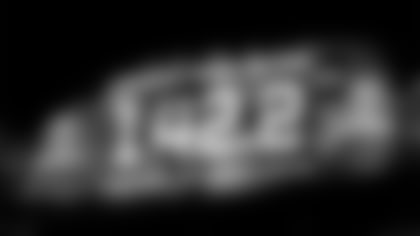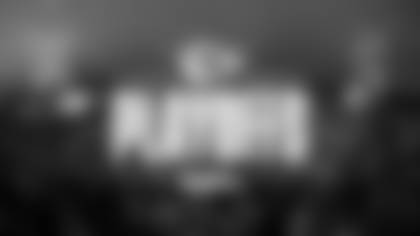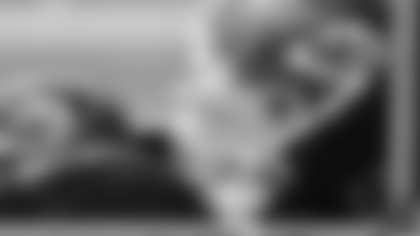OPENING STATEMENT: "As far as the injuries go, Jamaal Charles had blisters on the bottom of his feet and when I say that, they were pretty extensive. He should be okay. Dustin Colquitt had the knee sprain, and he should be fine. Eric Fisher had a concussion; I'm not sure exactly what it's done there. It didn't look like it was too bad. He was feeling pretty good, after the game. Brandon Flowers still has a little bit of knee inflammation, and we'll just see how that goes. I said this before but every win in the National Football League is a good win. We'll enjoy it for a day, until the players get back in, and then it's time to go. As coaches, we jumped back in and our enjoyment part of it is over, and we're getting ready for Tennessee. They're a good football team there. I was proud of the coaches for this game and the players and the way they went about their business. There are a lot of individual accolades that I could give out, but I thought just together as a football team, the guys played together. You saw the offense cheering on the defense, the defense cheering on the offense. If there was a turnover on the offensive side, the defensive-side guys were in there going, 'Hey listen, we got it. We'll take it from here.' And then vice versa, when the defense made a nice turnover, the offensive guys were congratulating (them). You saw it on Dexter (McCluster's) punt return, and Dexter's one of our guys who had a really good day, big third-down plays. I was proud of the guys like (Dustin) Colquitt, who got banged up on a leg that he's had issues with, surgeries on, and so on, but he pushed through that and got himself out there and kind of shook it off. Sometimes punters and kickers get a bad rap about toughness and that stuff, but this kid is a tough nut. You saw (Ryan) Succop, he had a couple of nice kicks, and we took one of them away, which I normally won't do. We thought he was really doing a nice job. Third downs were a factor, I thought, on both sides. Our ability to convert on third downs was big; I think we were somewhere in the fifties, 58 percent or somewhere in that area with the conversion rate. Our defense, their ability to stop the Giants on third down, I thought was also a big step. The turnovers kind of equaled out, where we had seven points off of the turnovers we received, the takeaways. They didn't get any off of the giveaways."
Q: Why did you take the field goal off of the board?
REID: "I felt like there was a bit of momentum, going at that point. The field position was obviously there, but maybe just a gut feeling (that) I had to trust on that. I can't tell you that I didn't have a little indigestion on that gut feeling, with the penalty right there, but we overcame that."
Q: What was the process with the Eric Fisher concussion?
REID: "I think when you look at it, he really hit more of the shoulder area than the head, which I think is a positive. That's why when I said, I mean I'm not a doctor, I don't evaluate these things, but he didn't take that direct blow, that big blow to the head, which I think is a good thing for him. That's the most important thing. When you start dealing with those, you're not talking about the team here; the kid is a person and not only now, but down the road. I think that that will end up being a plus for him as he's going forward. That's all I can tell you there; then, it's up to the doctors from there."
Q: Was it during the second down play?
REID: "I can't even tell you what down it was. It was our own guy that hit him. (Sean) McGrath hit him, so when you go back and look at it, you'll see that."
Q: What about the couple of blocked punts in the past couple of games and then the tipped ball this past game?
REID: "We have got to make sure we take care of that. I know (Dave) Toub is on it. The guys had a pretty good game, on that one, there. That was an impressive little stunt they had going. We have to do a better job, there. Communication becomes a factor when you pass things off."
Q: Is the communication issue because of the changing personnel?
REID: "Sometimes that's what ends up happening. You bring in the new guys and even though we're a month into this, we've been working on all of this since training camp and preseason and minicamps. It's one of those complex little stunts that comes up and if you haven't had a chance, if it's new, something that you haven't worked on, other than maybe in the offseason or during training camp, these guys haven't had the chance to do it; those will sneak by. But to answer your question, normally, that's where it's affected. If there's any change in that 53, it normally comes back to the special teams. We're getting better at it; we just have to keep getting better."
Q: Had you seen something in Marcus Cooper that showed you he was ready to start this week?
REID: "I know there are some guys that have stepped up here and (Marcus) Cooper is one of them. He's big, he's fast, and he's got good cover and good hips. It looks like he's very instinctive with things. He's young at the position; he's young in the league and he played wide receiver at Rutgers, before. It's just a matter of reps. Sure, he's competitive. I appreciate seeing that. I thought that was a pretty good (Giants) receiving corps, right there, and he didn't bow down at all. He came out and challenged and played good competitive football."
Q: What does it say about your team that you have Anthony Fasano helping out Sean McGrath?
REID: "It's an unselfish bunch, for sure. You saw (Brandon) Flowers doing the same thing with (Marcus) Cooper, so I appreciate that part. McGrath has a good attitude about him, he works hard. You have to be able to carry yourself a certain way to get to where the veterans help you out like that. If you don't handle yourself the right way, you're not going to get that extra help there. Those guys have handled themselves properly with their work ethic and their openness to any kind of points they can get from these guys. It's kind of a two-way deal."
Q: Have you seen any signs that Dexter McCluster was going to have a break out week this week, with his big play on special teams?
REID: "Well Dave (Toub) will tell you, he's been up here; he'll tell you we're like one block or one step away from getting one. I've heard that the last couple of weeks, so we got that now. There were some phenomenal moves there that he made. That was something special and when you start putting in multiple guys that had the opportunity to tackle you and you made them miss, it was a pretty good return."
Q: What about his contribution to the offense this week?
REID: "Yeah, the ones that jump out to me are the third-down catches. I thought he did a nice job. Those were all reads that he and the quarterback had to be on the same page with, so I thought they did a nice job there with that."
Q: Talking about the Alex Smith interceptions, how much responsibility was it for the receiver in that situation?
REID: "Sometimes turnovers can be a little bit of everybody's deal. Inevitably, the quarterback will stand up there and tell you that he was holding the ball last, but it's the same way with sacks. They involve more than one person, and I tell you the same thing with a couple of these turnovers."
Q: You made it seem like the receivers did have some responsibility there.
REID: "I'm not going to pinpoint one thing. I could have put them in a better position, the receiver could have run a little better route, the quarterback had the ball and could have (fixed that), all of that stuff goes into it. They got us."
Q: How do you decide whether to make a "gut" decision vs. a "by the book" decision on the sideline?
REID: "If they're right, it's a good gut decision. If they're wrong, I probably should have done it by the book. There are going to be a few of those during the year that you're going to have to make and you're sitting right there on that picket fence. If it works you're ok, if it doesn't, that's the human element of the game and you probably should have gone the other way with it."
Q: How has the team been able to become such a successful closing team?
REID: "I mentioned this last night, but Barry (Rubin) and his crew in there do a great job of getting the guys in shape. This isn't something that just takes place right now, but it's taken place all the way through the offseason and this allows you as a coach to be functioning at a high level, throughout that fourth quarter. Then you add the trainer into the mix; it's a group effort. It's the players and their want to do those things and to listen to those guys and train themselves right and then they maintain that focus and that confidence, once you get into the fourth quarter that you know you have some juice left, especially in a hard fought game. That score was a little crazy; that really doesn't tell you the full story, all the way to that fourth quarter, that was a battle. The guys maintained their presence and played at a high level."
Q: What's it like knowing you have a guy like Jamaal Charles that you can move around?
REID: "I mean, it's great. I know Romeo (Crennel) probably would have told you the same thing, this guys is a great player, and (Todd) Haley, before that. He's a heck of a football player. He wants the ball, which you appreciate. I really appreciated it after I saw his feet and the blisters on them. His feet were just a mess. The kid is a tough kid. He likes to play and you appreciate that."
Q: How has he been so successful in the fourth quarter?
REID: "I think, really we were presented with an eight-man front, basically the whole game. It was nuts, that way. It was all single-safety in the middle, and they were coming after it a little bit. I would tell you that Coach (Andy) Heck gets some credit for that, just making sure some things were situated. We're not afraid to repeat a play to make sure we get it right, don't throw it out after the first try, let's come back to figure it out. Then he coaches them up. Then we come back and Eric (Bieniemy) makes sure he gets with Andy and they talk through it and try to find out exactly the problem. Then he communicates it with (Jamaal) Charles, then he's able to make whatever adjustment he needs to make. It's a bit of a process that goes on, but I think they're working well with that."
Q: So there's no "saving the best for last" going on?
REID: "No, I'd like to say that, but that's not the case. You have a bunch of plays that you go through and you're not sure exactly what the defense is going to give you, but you hope you have the right ones that you practiced. There's a little bit of that, but most of it is just figuring out how you can take your core plays and make them a little better, based on what they're showing you."
Q: How was the crowd yesterday?
REID: "The crowd was unreal. They were like redheads."
Q: Is there a certain way to play a defense like they had, the cover-one defense?
REID: "There are certain things you dial up. You saw a lot of that yesterday from both sides, from our defense and their defense. What you have to do is you have to win those man-to-man battles. It comes down to those individual battles and how you can work it from there, all the way across the board, not only up front, but outside. You're going to have some good plays, and you're going to have some plays that don't look so good and you just have to keep battling through it."














